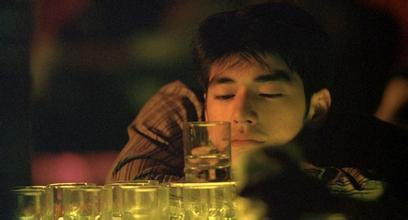The Disguised Selves in ChungkingExpress
“Hong Kong is an outcome of interaction amonglocal history, national context, and global linkage” (Mathews etal. viii). The unique and complex constitution of Hong Kong hasconsiderable influence on the Hong Kong society. The HongKong-based director Wong Kar-wai screens his personal understandingof this society, not as an adjacent of the mainland China, but as aheterogeneous entity where can be as dazzling as the colorfulmélange of people and trivial things in Wong’s films. Although itdifferentiates itself from Wong’s other films regarding the storyand setting, Chungking Express (1994) confronts theessentially same problem—characters are profoundly lonely becausethey hide their real identities behind their disguises. Only whenthey break away from their disguises can they express their loveand retrieve their losses.
Hong Kong, the over-crowded metropolitan where one loses his/herown identity under the influence of money, westernization, andconsumerism, is Wong Kar-wai’s central concern. “In many ways,Chungking Express is a love letter to Wong’s vitally frenetichometown, Hong Kong…” (Brunette 54) Wong’s protagonists are ontheir journey of searching, escaping and falling in love in thisexhilarating kaleidoscope of different people where consumption andmoney conquer everything. The two locations that the director shotin this film reveal the nature of Hong Kong. Chungking Mansions isa hodgepodge of identities — local people, westerners, Indians,policemen and drug dealers are all mingled together. They may workin different places, such as hardware shops, bars, restaurants, andconvenient stores; but they have one feature in common, that isthey all holding their true selves behind their day-time jobs andappearances. The Indians dress themselves as a group of legalimmigrants before they attempt to smuggle heroin to America; theAsian woman in the pub needs to put on a wig before she has sexwith her boss; and the female drug dealer (Brigitte Lin) wears herquixotic outfit wondering alone on Hong Kong streets. In Hong Kong,everyone wants money and sex. Mr. Doyle’s restless“tied-to-the-back-of-a-monkey-camerawork” (Han & Wang 54)jitters the stark revelation of their agitation and apprehensionunder their disguises. The Midnight Express in the second part, onthe other hand, does not explicitly flag desires or disguises. Itelaborates Hong Kong’s consumption culture that imposes a sense ofloss on people at times. “If she [the flight attendant] has achoice of dinners, she also has a choice of lovers.” Hong Kong as aconsumption society shapes people’ demeanors and their way of life:they are not in the mood of waiting. Everything in the food bar isinstant: you come, you pay and you have your take-away. But theycan move so fast that they do not know what they are chasing after.In a balanced frame of shot where Faye and Cop 663 each stands byone side of the bar, perusing the stream of people flowing in frontof them, they get lost in the “impressionistic flamboyance” (Bear& Wang 49) of Hong Kong. “They [are] loners” (Han & Wang54).
The disguises in this film appear in different ways. Theunidentified drug dealer’s (Brigitte Lin) blonde wig, sun glasses,and rain coat is the most ostensible disguise in the film. Inasmuchas she lives in an overwhelming insecurity and anxiety, she isready to escape anytime—whenever she wears rain coat, she wears hersunglasses in case the weather changes. Even in the evening, shewears her sun glasses, thus people like Cop 223 (Takeshi Keneshiro)will not read her eyes and discover her forsakened true self. Outof the intention to protect herself, she chooses to shut herselfdown by wearing her disguise. After she ends her endangered statuswith one shot at her boss, she throws her wig on the ground andcatches her escaping flight in the early morning, whereupon sheretrieves her freedom and safety.
The background music “California Dreamin’” is Faye’s disguise ofher true feelings to Cop 663. Behind the bar at Midnight Express,Faye (Faye Wong) plays loud, deafening music, wiggling her waist,swaying her arms up and down, keeping her eyes closed, and slightlyshaking her head. When Cop 663 (Tony Leung Chiu Wai) asks: “Youlike noisy music?” She answers: “Yes. The louder the better. Stopsme from thinking.” She emerges herself deep into the “CaliforniaDreamin,” pretending that she does not care about people aroundher, including Cop 663, that she is dreaming her own dream (at onepoint she tells him that she is saving money for a trip toCalifornia). The truth is, however, she falls in love with him, butshe does not want to be caught by him.
In Cop 663’s apartment, Faye also plays this music while she iscleaning and redecorating his house. Changing the table clothes andthe labels on his canned food, dusting his closet, hanging newclothes in his wardrobe… She acts as if she is the owner of thisapartment. After she has cleaned the apartment, she put on Cop663’s ex-girlfriend’s suit, lying on his couch, half dreaming, halfintoxicated in her own fantasy. This time, the music alsosymbolizes another self of her (perhaps her dream self)—Cop 663’sgirlfriend. In her subconscious, she interchanges her role with Cop663’s ex-girlfriend (ValerieChow) by dressing in her clothes. This interchange is alsoshown previously when Cop 663 ex-girlfriend leaves a letter for Cop663 at Midnight Express. Faye looks at her from head to toe forseveral times, intentionally stands beside her to compare herheight and figure with this flight attendant. Her jealousy is easyto detect.
Unlike the plainclothes Cop 223 in the first part, Cop 663 wearshis policeman uniform which symbolizes Cop 663’s disguise. In hisuniform, he is the ordinary policeman who buys chef salad for hisgirlfriend every night, who talks to the sliming soap, weepingtowel in his apartment; in his casual clothes, he is the man whoasks Faye out, who owns the food stall, and who is ready to goeverywhere in the world. The latter 663, apparently, is his realself. But it takes time and trial to peel off his uniformdisguise.
Cop 663 in uniform needs a woman in his life, but she canvirtually be anyone. He does not care what hisgirlfriend likes to eat, chef salad or fish and chips; nor what shelikes to listen to, “California Dreamin’” or“What a Difference aDay Makes.” When he realizes what Faye has done for him, heimmediately asks her out for a date without more patience to knowmore about her. Faye is right in not dating him on that rainy nightbecause neither of them has their real self to love. Faye needs tofollow her heart to fly to California, and Cop 663 take off hispoliceman suit, purchase Midnight Express in his casual clothes.When Faye finds what she wants, that is her true self, shetransform from a quirky, boyish snack bar worker to a lady-likeflight attendant who is ready to take Cop 663 to wherever shewants.
In a hyperactive city like Hong Kong, people all have their desiresand troubles that they do not want to expose. Likewise, charactersin Chungking Express have their respective disguises to hidetheir true feelings. Wong Kar-wai represents this phenomenon withhis characters struggle between their real selves and theirdisguises. By abandoning their disguises, Wong’s characters returnto their true selves.
Works Cited
Brunette, Peter. Wong Kar-wai. Illinois: University ofIllinois Press, 2005. Print.
Han, Ong & Wang, Kar-wai. “Wong Kar-wai.” BOMB, No.62, 1998, pp. 48-54.
Bear, Liza & Wang, Kar-wai. “Wong Kar-wai.” BOMB, No.75, 2001, pp. 48-52.
Mathews, Gordon. Lu, Dale. Lui, Tai-lok. Consuming HongKong. Hong Kong: Hong Kong University Press, 2001. Print.
Britannica encyclopedia:
Self,the “I” asexperienced by an individual. In modern psychology the notion oftheselfhasreplaced earlier conceptions of thesoul.
The concept oftheselfhasbeen a central feature of manypersonalitytheories,including those of Sigmund Freud, Alfred Adler,CarlJung,Gordon W. Allport, Karen Horney, Carl Rogers, Rollo May, andAbraham H. Maslow.
According to Carl Jungtheselfis atotality consisting of conscious and unconscious contents thatdwarfs theegoinscope and intensity. The maturation oftheselfistheindividuationprocess,which is the goal of the healthy personality.
Rogerstheorizedthat a person’sself-conceptdetermines hisbehaviourandhis relation to the world, and that true therapeutic improvementoccurs only when the individual changes hisownself-concept.May’sapproachwas similarly existential; he conceivedtheselfas adynamic entity, alive with potentiality.Maslow’stheoryofself-actualizationwasbased on a hierarchy of needs and emphasized the highest capacitiesor gratifications of a person.Seealsohumanisticpsychology.
The notion ofpersonalidentity
One makes a judgment ofpersonalidentitywheneverone says that a person existing at one time is the same as a personexisting at another time: e.g., that thepresidentof the United Statesin1802—namely,ThomasJefferson—was the person who in 1776 was the primary author oftheDeclarationof Independence. Matters of great importance often turn on thetruth of such judgments. Whether someone should be punished for acrime, for example, depends on whether he is the person whocommitted it, and whether someone is the owner of something now maydepend on whether he is the person who purchased it at some pasttime. Whether there is personalimmortality,or survival ofdeath,depends on whether a person who dies can be identical with a personexisting subsequent to that person’sdeath.

The topic ofpersonalidentityhasto do with what the truth of judgments ofpersonalidentityconsistsof and how it can be known. Equivalently, it has to do with thenature of the persistence of persons through time and theirawareness of such persistence. Some scholars, such as the20th-century American philosopherRoderickChisholm, have denied that there can be an informative answerto such questions; they think thatpersonalidentityis “simple andunanalyzable.” But it seems plausible that something can be saidabout what the sameness through time of automobiles, rivers, andcities consists of, and so it is natural to think that the sameshould be true of the sameness through time of persons.
 爱华网
爱华网


